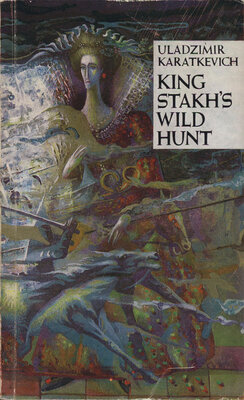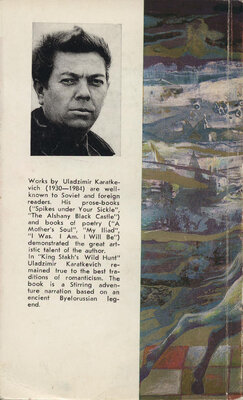King Stakh's Wild Hunt
Уладзімір Караткевіч
Выдавец: Мастацкая літаратура
Памер: 248с.
Мінск 1989
“If only it is not a phantom, this Wild Hunt, a vision seen in a dream when asleep. Well, there wasn’t, there has never yet been a person who was able to hide his tracks from me, the best of hunters. But phantoms will be phantoms.”
We took our leave of Rygor. I, too, agreed partially with his last words. There was something supernatural about this Hunt. This cry that turned one’s heart to ice — it couldn’t come from a human chest. The thundering hoofs heard from time to time. The dryckgants a breed already extinct, and even if they can still be found, who in such a remote corner as ours, is wealthy enough to have been able to buy these horses? Somehow this must be connected with King Stakh’s Wild Hunt. Who is this Lady-in-Blue whose ghost disappeared in the night, if her twin (a twin entirely unlike her) is peacefully sleeping in her room? To whom does this awful face belong, the face that looked at me through the window? My head was splitting. Yes, there was something unnatural going on here, something criminal and frightening, a kind of mixture of devilry and reality.
I looked at Svetilovich, walking at my side, merry and playful, as if these questions didn’t exist as far as he was concerned. The morning
was indeed a beautiful one: although the weather was cloudy and dull, the sun was not far away, and each little yellow leaf on the trees thrilled, and it even seemed that they were turning towards the dew in the warm autumn sun.
Through the glade we saw a level plain far ahead, and farther on — the boundless brown bog and the heather waste land. Marsh Firs was far behind them. And in all this there was a kind of sad, incomprehensible beauty, a beauty that made the heart in every son of these depressing places beat both painfully and sweetly.
“Look, a little aspen tree has run out into the field. It has become shy and begun to blush, reddening all over, poor thing,” Svetilovich said, deeply moved.
Moving forward, he stood at the precipice. His ascetic mouth softened, a timid, wandering smile appeared on his face. His eyes looked into the distance, and he himself, his entire body, seemed to have become weightless, impetuous, ready to soar upward above our dear, poor earth.
“This is how such as he ascend the cross,” I again thought. “A beautiful head under the filthy, rotten axe...”
And really, one sensed a kind of thirst for life and a readiness for self-sacrifice in this beautiful face, in these “lilywhite” hands, as our ancestor-poets would have put it, in the fine, slender neck, in the steady brown eyes with their long lashes, but with a metallic lustre in their depths.
“Ah, my land!” he sighed. “My dear, my only one! How cold your attitude towards the little aspens that run out into the field ahead of all
the others, and into the light. They are the first to be broken by the wind. Don’t be in such a hurry, you little fool... But it cannot help itself. It must.”
I put my hand on his shoulder, but I quickly removed it. I understood that he was not at all like me, that now he was soaring above the earth, that he was not here. He was not even ashamed of using high-faluting words which men usually avoid.
“Do you remember, Belaretzky, your preface to ‘Byelorussian Songs, Ballads and Legends?’ I remember: ‘My Byelorussian heart became embittered when I saw that our best, our golden words and deeds had fallen into oblivion.’ Wonderful words! For these words alone your sins will be forgiven you. So what then is there to be said, when not only my Byelorussian, but my human heart, aches at the thought of our neglect and the human suffering, the useless tears of our unfortunate mothers. It is impossible, impossible to live like this, my dear Belaretzky. It is in man’s nature to be kind, but he is turned into an animal. Nobody, nobody, wishes to let him be a human being. Simply to cry: ‘People, embrace one another!’ is, evidently, not enough. And there are people here who keep going to the rack. Not for the sake of glory, but for conscience’ sake, to kill the torments of conscience — as a man does when he goes into a dense forest, although he doesn’t know the way, to save a friend, because he knows that it is shameful, shameful to stop, to stand still. So they go on, stray, and perish.
“They know only that a person mustn’t be like that, that it is no good promising him pie in the sky, that he needs to have happiness under these ceilings so covered with smoke. And they
are more courageous than Christ: they know that there is no resurrection after the crucifixion. Only crows will fly over them and women will bewail them. And chiefly, their saintly mothers.”
At this moment he seemed superhuman to me, so fine, so worthy, that I felt terrified and foresaw his death through the veiled future. Such as he do not live. Where will it be? On the rack in a torture-chamber? On the scaffold facing the people? In a hopeless battle of insurgents against the army? At a writing-desk hurriedly writing down his last fiery thoughts, breathing his last breath? In a prison corridor, shot in the back, not daring to look him in the eyes?
His eyes were shining.
“Kalinowsky went to the gallows. Perowskaya, a woman you would be willing to die for her on the scaffold... Such beauty — with a dirty rope round her neck. You know, Yanowskaya resembles her somewhat. That’s why I idolize her, although that’s not quite exactly so. But she was an aristocrat. That means there is a way out for some of our people, too. Only you must follow their path, if you do not want to rot alive... They strangled her. You think all can be strangled? Our strength is growing. If I could hang with them, even by a rib from the hook, to prevent King Stakh’s Wild Hunt tearing across the land at a mad pace, to stop the horrors of the past, its apocalypse, death. I’ll leave as soon as I finish with this. I can’t stay here. You know what friends I have, what we have in mind to do? They shall tremble, those fat ones, they shall! We haven’t all been strangled to death. This means a great fire. And the years, the years ahead! How much suffering,
how much happiness! What a golden, magic expanse is ahead! What a future awaits us!”
Tears spurted from his eyes, uncontrollable tears. I don’t remember how we parted. I remember only his fine slender figure visible at the top of the burial mound. He turned round towards me, waved his hat and shouted:
“Years and years are ahead of us! Great expanses! The sun!”
And he disappeared. I went home. I believed I could do anything now. Of what significance was the gloom of Marsh Firs, if ahead were great expanses, the sun and faith? I believed that I’d fulfil everything, that our nation was alive if it could give birth to such people.
The day was yet ahead, such a long one, shining, potent. My eyes looked to meet it and the sun which was hidden as yet behind the clouds.
CHAPTER THE ELEVENTH
That very night at about 11 o’clock, I was lying hidden in the lilac tree at the brokendown fence. I was in an uplifted mood, absolutely without fear (and in this state I remained until the very end of my stay at Marsh Firs). It seemed to me that crows could peck at somebody else’s body, that had nothing at all to do with me; but they could not peck at mine that 1 loved, my strong and slender body. Whereas in the meantime the situation was a sad one. And the time, too, was sad.
It was almost quite dark. Over the smooth, gloomy expanse of the Gap, low black clouds had gathered, promising a pouring rain by nightfall (the autumn in general was a bad one
and dreary, but with frequent, heavy showers, as in summer). A wind arose, in the blackishgreen pyramids of the firs it became noisy, then again became quiet. The clouds swam slowly along, piled over the hopeless, level landscape. Somewhere, far, far away a light flashed and, having winked, went out. A feeling of loneliness crept over my heart. I was a stranger here. Svetilovich was really worthy of Nadzeya, while absolutely nobody had any need of me here. As of a hole in a fence.
Whether I lay there long or not — I cannot say. The clouds right overhead thinned out, but new ones arose.
A strange sound struck my ears: somewhere in the distance, and as it seemed to me, to my right, a hunter’s horn sounded, and although I knew that was aside from the path the Wild Hunt was on, involuntarily I began to look more frequently in that direction. Yet another thing began to trouble me: white fragments of fog began to appear here and there in marshes. But with that everything ended. Suddenly another sound flew over towards me — the dry heather began to rustle somewhere. I glanced in that direction, looked until my eyes began to ache, and at last noticed some spots moving against the dark background of the distant forests.
For an instant I shut my eyes for them to “come to”, and when 1 opened them, straight ahead of me and not at all far away, the dim silhouettes of horsemen became visible. Again, as previously, they were flying across the air in great leaps. And complete silence, as if I had become deaf, enveloped them. The sharp tops of their cocked felt hats, their hair and capes waving with the wind, their lances — all this
imprinted itself on my memory. I began to crawl back closer to the brick foundation of the fence. The Hunt swung around, then recklessly bunched together in confusion — and began to turn about. I took my revolver from my pocket.
They were few in number, less than ever, eight riders. Where have you put the rest, King Stakh? Where have you sent them to? I placed the revolver on the bent elbow of my left arm and fired. I am not a bad shot and can hit the mark in almost complete darkness, but here something surprising happened: the horsemen galloped on as if nothing had disturbed them. I noticed the last one — a tall, strong man, and I fired: but he didn’t even stagger.
The Wild Hunt, as if desiring to prove to me it was illusive, turned about and was already galloping sidewards of me, out of reach of my shots. I began to crawl on my back to the bushes and succeeded in coming nearer to them, when someone jumped on me and a terribly heavy weight pinned me to the ground. The last bit of air in my lungs escaped, I even moaned. And I immediately understood that this was a person it was not worth my while to measure either my weight or strength with.
 КНІГІ ОНЛАЙН
КНІГІ ОНЛАЙН


